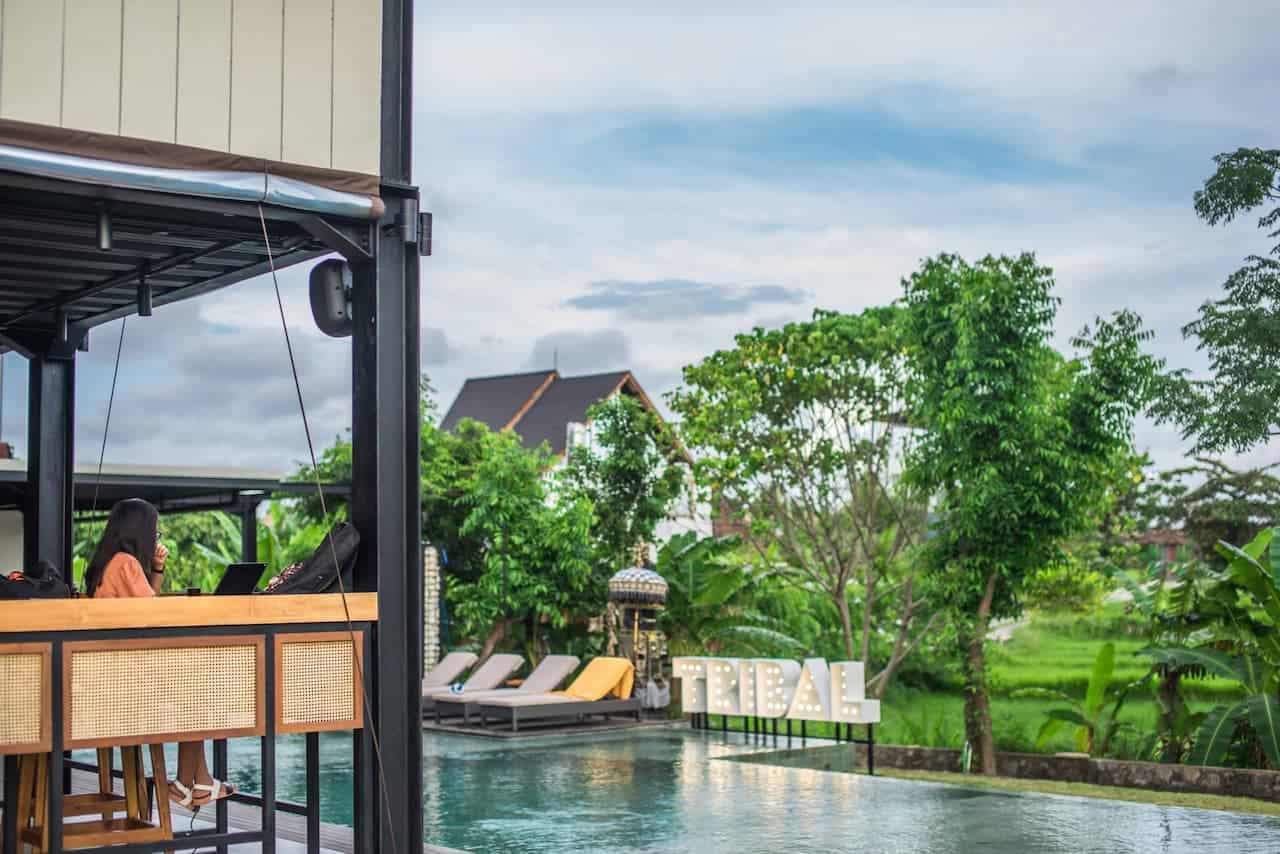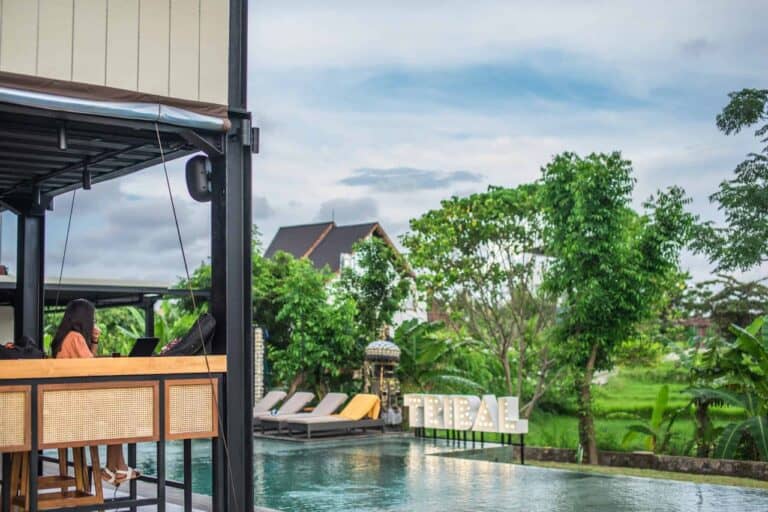There are not a lot of places that suit digital nomads as perfectly as Bali. It’s no wonder, this tropical island checks off every box on the ‘what do digital nomads want?’ list.
The internet is excellent, it’s full of interesting people, the standard of living is high for a pretty low price, and there are many, many co-working spots literally made for digital nomads! To top it off, it’s hot all year round.
Here’s what you should know if you’re dreaming of becoming a Bali digital nomad.
Why Bali?
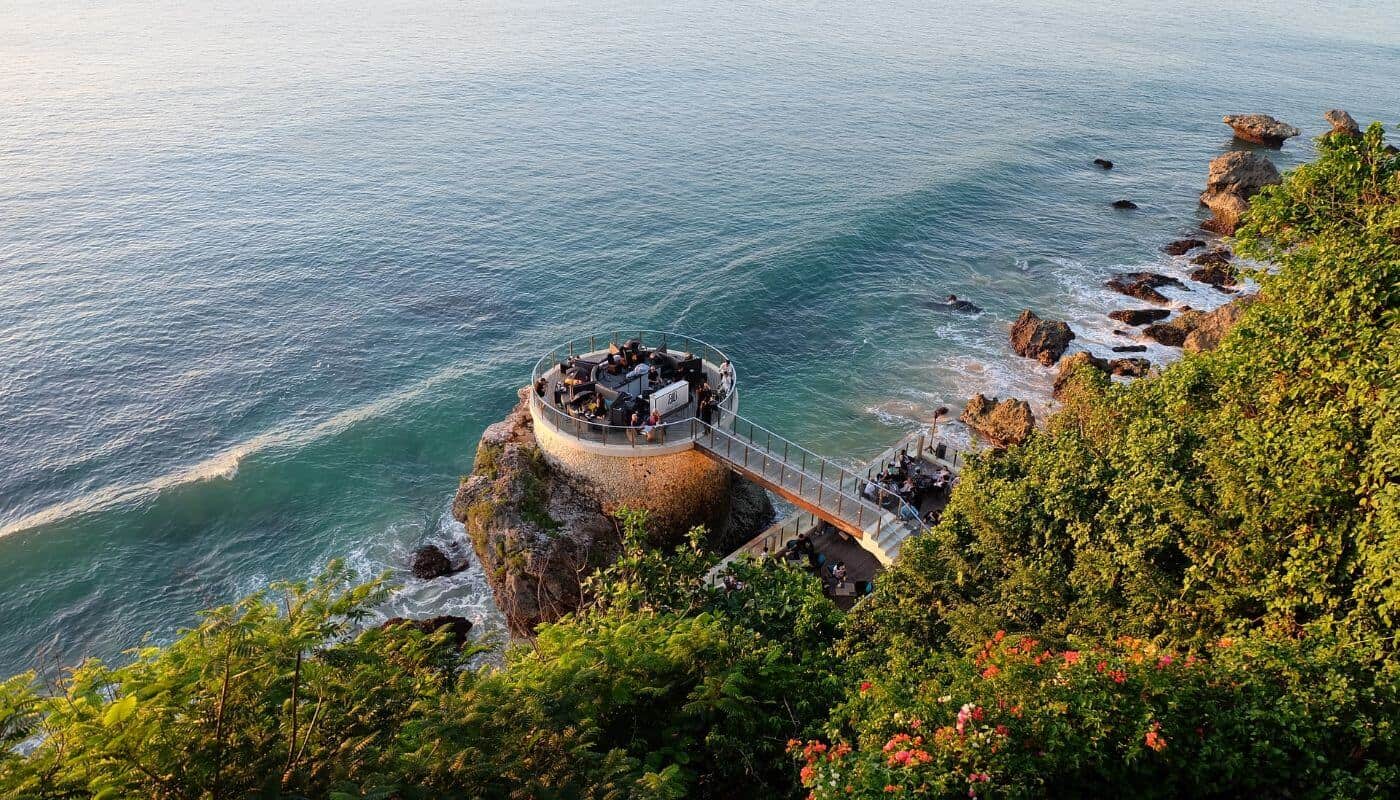
There’s a plethora of reasons why the Island of the Gods is one of the best places in the world for digital nomads.
The first thing is without a doubt the community. It’s big, welcoming and ridiculously interesting, filled with nomads from all over the world!
Bali has been a popular holiday destination for a long time, it has everything you could hope for.
- There are co-working spaces and work-friendly cafés, giving you a new spot to get to business every day. All these spots are so beautiful they look like they have come straight off a Pinterest board.
- It’s easy to find fully serviced housing with housekeepers, gardeners and even private chefs! (Ideal if you’ve dreamed of never having to do your own laundry again).
- When you’re feeling lazy, you don’t have to leave your villa. You can get everything delivered to your door – and I mean everything! From take-out dinners and groceries, to massages and booze. I recently needed a new laptop charger, I texted a computer store and had one delivered to my home in an hour.
- If you’re not too savvy with languages, you’ll find it easy to navigate life in English. Although it’s always best to learn some Indonesian!
After you’re finished up a day of work, it’s time to play. You’ve probably never seen a better work-life balance.
Sure, Bali is known for its crazy parties, but if you’re looking for a healthier lifestyle, it’s a great place to be. Get fit at some of the best gyms in Bali with martial arts, horse-back riding, crossfit, salsa dancing or surfing (now that one is a real Bali classic), and nurture your mind with yoga, meditation and sound healing.
Spas are a popular pastime and incredibly affordable compared to Western countries. Treat yourself to a relaxing massage after a day of hunching over your laptop!
Finally, we can’t not talk about “Bali magic”. After being here for almost a year, I can confirm that it’s true. There is something different in the air, something that inspires people to come for a holiday, fall in love and stay a lifetime.
Where Should Digital Nomads Stay in Bali?
In general, there are two main nomad hubs: Canggu and Ubud. Both have their own little qualities and quirks, so depending on what you value, either could be a great place to stay.
Canggu
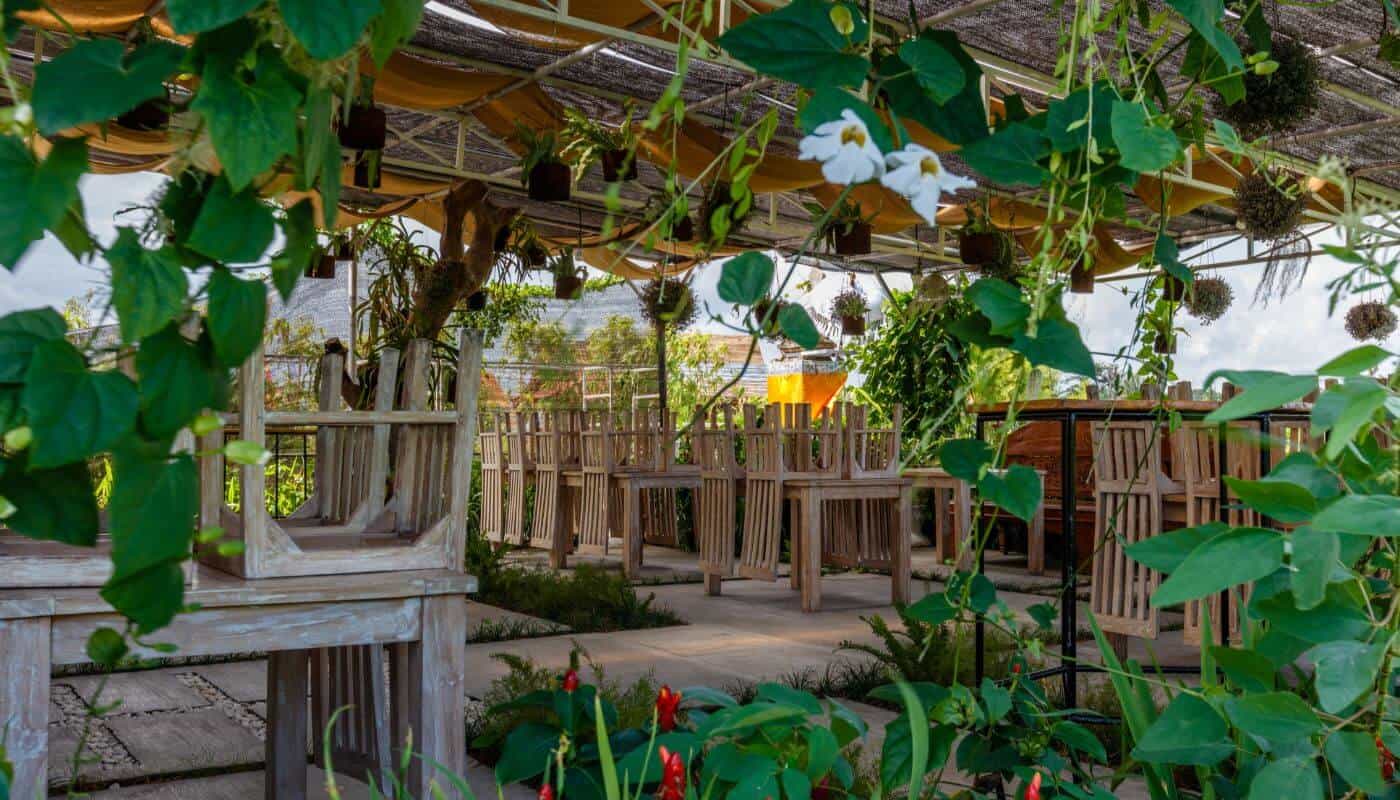
Bali digital nomads usually choose to stay in Canggu.
It is full of trendy cafés, co-working spaces, bars and restaurants, and has events on most nights of the week! Whether you like free-flow drinks, sculpting nude models or jamming to live music, Canggu has it! It’s like a big city and a small village all rolled into one, combining the best of both worlds.
Canggu is incredibly nomad-friendly with LOADS of options for co-working spots. There are dedicated co-working spaces, but also a huge amount of pretty cafés and restaurants with comfy seats and super-speed Wifi.
Did I mention that the food in Canggu is delicious? (Well, food all over the island is incredible) It’s easy to eat healthy in Canggu. There’s a place for almost any special diet. I’m not only talking vegan and gluten-free, this includes keto and paleo friendly spots.
Most digital nomads in bali flock to Canggu because of its variety. Is there a hobby you’ve always wanted to start? You can do it in Canggu!
Fitness studios and Canggu spas cater to your body, while yoga classes and sunset beach walks care for your soul. Surfing is a must in Canggu. You can simply rock up on Batu Bolong Beach and be on the waves in five minutes with a hand from a local surf instructor – or, if you’re already a pro, you can rent a board for as little as 3 USD.
The nightlife in Canggu is legendary. The Lawn is popping every Friday and Saturday night, with Sand Bar being the host of the after party. Black Sands Brewery caters to the pub-lover in you with their craft beers. Check out Deus Ex Machina to see the best parts of the Canggu community. This skater-surfer inspired spot hosts open mic and comedy nights, and on Tuesdays you can get a free tattoo with a side of tacos!
Ubud
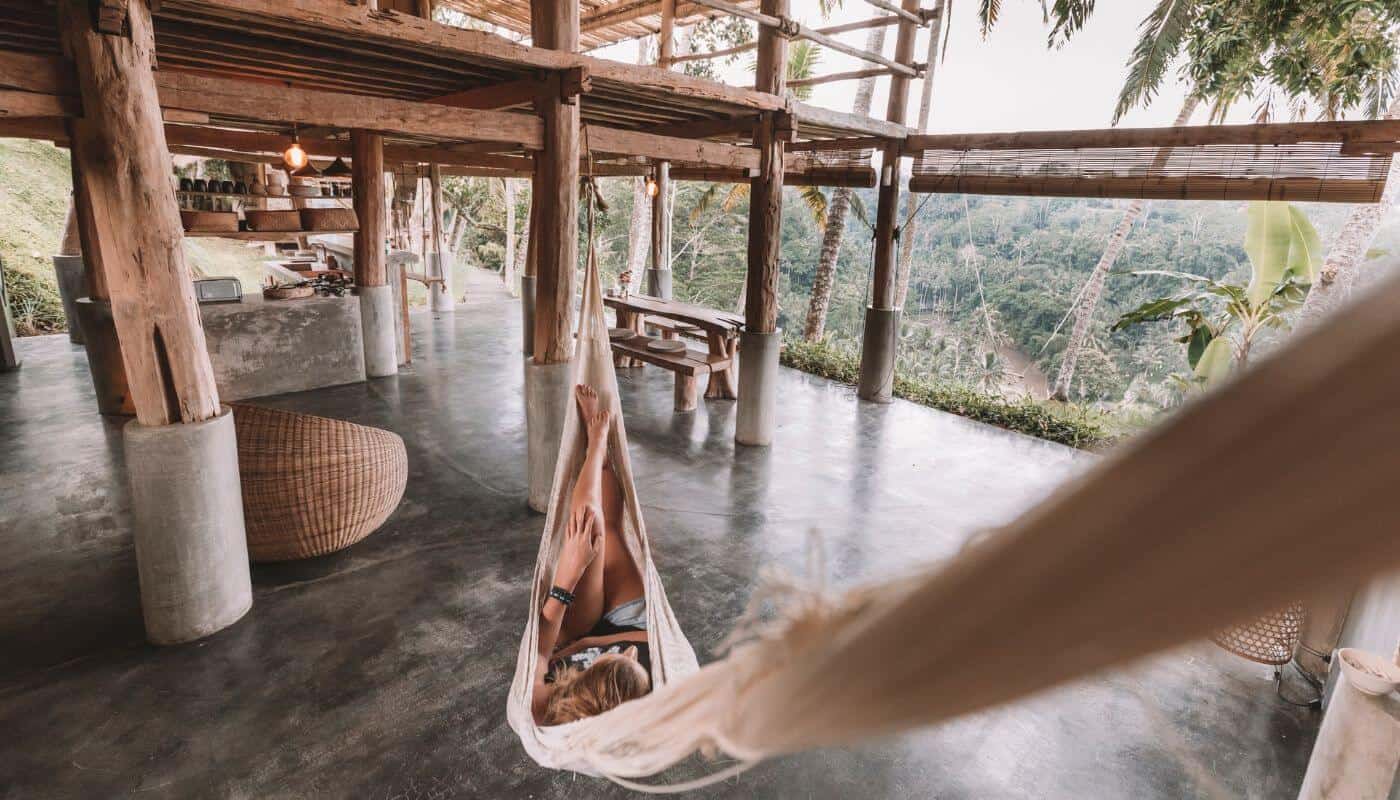
Ubud is the centre of Balinese art and culture. It has all the best galleries, temples and food markets.
It’s the heart of Bali, and is a scenic town between Canggu (30 minutes by scooter) and the mountains (an hour north by scooter). Ubud is a favourite for those looking for personal and spiritual growth. It’s also great if you want to be surrounded by nature and in a more local area, away from the hectic south,
Other towns
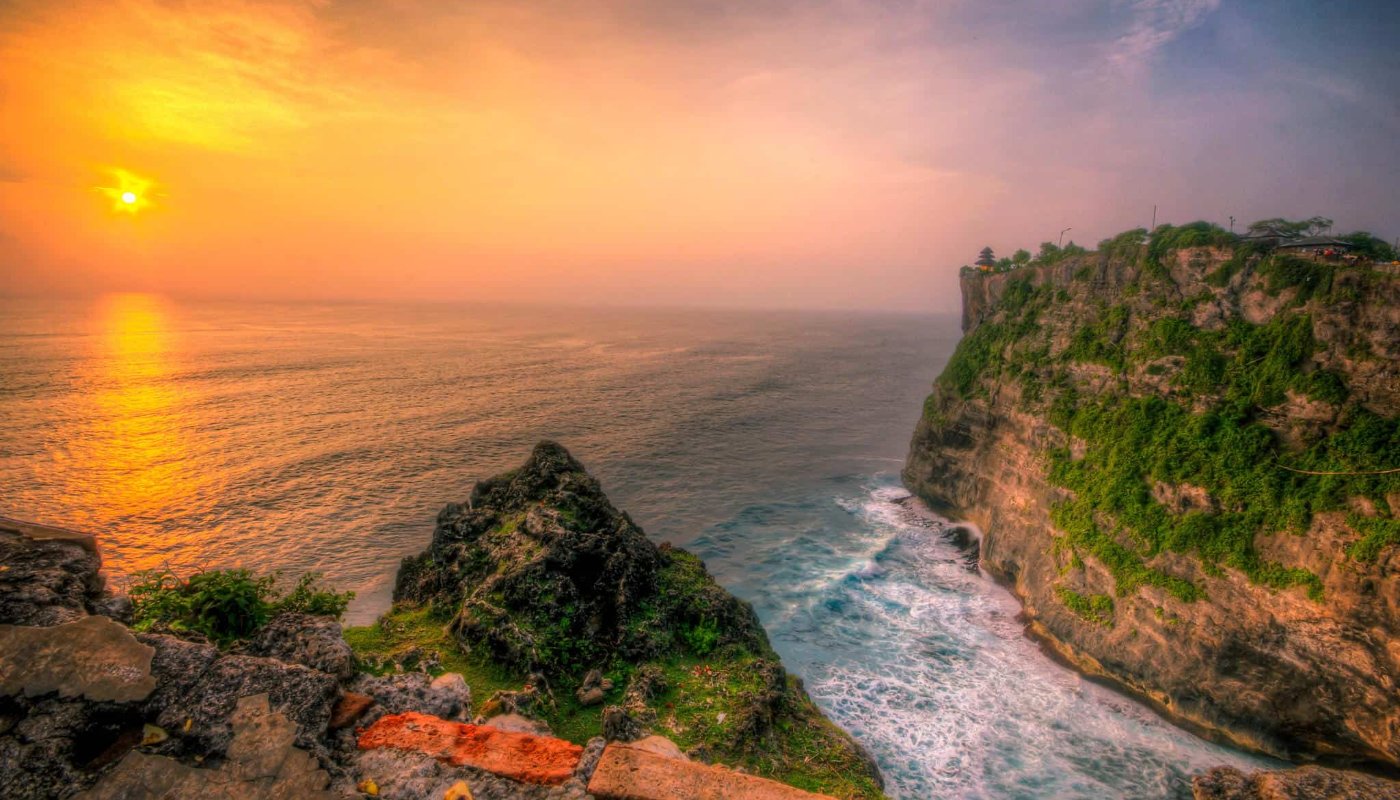
There are a few other spots around the island that have a smaller community, mostly revolving around a specific hobby: Uluwatu is popular with surfers, and Amed on the northeast coast (3 hours from Canggu) is teeming with divers.
TLDR
Ubud is a great place to stay in Bali if you like peace and quiet, and Canggu is awesome for parties, working and networking.
Working Online in Bali

Bali is a beautiful setting to complete your remote university classes, start your business, extend your freelancing portfolio or work remotely for your company back home.
Here are the most important things you should know about working online in Bali.
Internet in Bali
- Internet, in general, is excellent. Most cafés, restaurants, villas and hotels have high-speed Wifi available. Wifi also passes the “Netflix test”. It’s possible to stream videos, upload content online and download work materials painlessly.
- Mobile data plans are cheap. You can buy a prepaid SIM card for about USD$3.50-$5 at a phone store. A 12GB data package might cost about USD$8. Data packages last for 30 days, after which you can just go back to the phone store and top up your credit.
- The voltage in Indonesia is 230 V, and you’ll need a power plug type C or F.
- The internet censorship might come as a surprise to digital nomads in Bali. You can access social media without problems but some websites like Reddit have been blocked. Get a VPN to navigate around these blocks and you’ll be good to go!
Where to Work

Cafés in Canggu were designed in some digital-nomad heaven, since most of them have high-speed internet, comfy seats and plugs next to tables. They also don’t mind you sitting there as long as you buy a little something – most cafés don’t have a minimum spend limit.
Even though Canggu is tropical and hot all-year-round, it was a sweaty surprise to see that many cafés and restaurants favour open design instead of enclosed and air-conditioned work spaces. If you overheat easily, there are a few places with AC like Koloni, Monsieur Spoon, Amolas Café, Nude, and Machinery.
Another very popular option for remote workers are co-working spaces. They usually charge a daily or monthly fee that includes access to their co-working areas and events, and offer discounts around the town. The prices are quite expensive but co-working spaces are some of the best places to link up with other digital nomads in Canggu so it’s definitely worth the money.
My favourite co-working space in Canggu is Tribal. It is huge, open and so well equipped! The range of seating options makes a long day of work super comfortable, their menu is stacked with incredible food, and there’s a pool to refresh and get your blood pumping. Honestly, if you are only going to try one co-working space in Canggu, it HAS to be Tribal.
Tribal Hostel
Getting a Digital Nomad Visa for Bali
Disclaimer: there is no official digital nomad visa for Bali, and staying extended time in Indonesia without an appropriate visa can carry some heavy fines and punishment. Get in touch with a visa agent for full info and options before travelling to Bali.
You have a few options:
- Visa on arrival (free), 30 days
- Visa on arrival (USD$35), up to 60 days
- Social visa (USD$50), up to 6 months
- Business visa (USD$850 for 1 year or USD$1,200 for 2 years)
Most digital nomads in Bali get a visa on arrival (VOA); either the free visa waiver that allows you to stay for 30 days before you need to get going, or a paid one (USD$35) that lets you extend once, i.e. you can stay 60 days in total.
It’s also possible to get a social visa that, through extensions, allows you to stay up to 6 months. It does require a letter of sponsorship, so VOAs are often the least complicated way to enter. Be sure to find a legitimate visa agent for these options.
You need an appropriate visa to work in Indonesia. Working online in Bali is in a semi-legal grey area. Technically not illegal if you’re not working for an Indonesian employer, but it is something nomads have got in trouble for before.
Most digital nomads who are planning to live here, and work for an Indonesian company, get a business visa. These are incredibly hard to get and need a LOT of documentation.
There are other options e.g. an investors visa. If you have endless cash and are looking to setup a business in Indonesia, this is the best option for you!
So far, an actual digital nomad visa for Indonesia doesn’t exist. A group of expats and digital nomads has been advocating for years, and it’s gained enough momentum to be accepted for review by the Indonesian government… Stay tuned.
Cost of Living in Bali
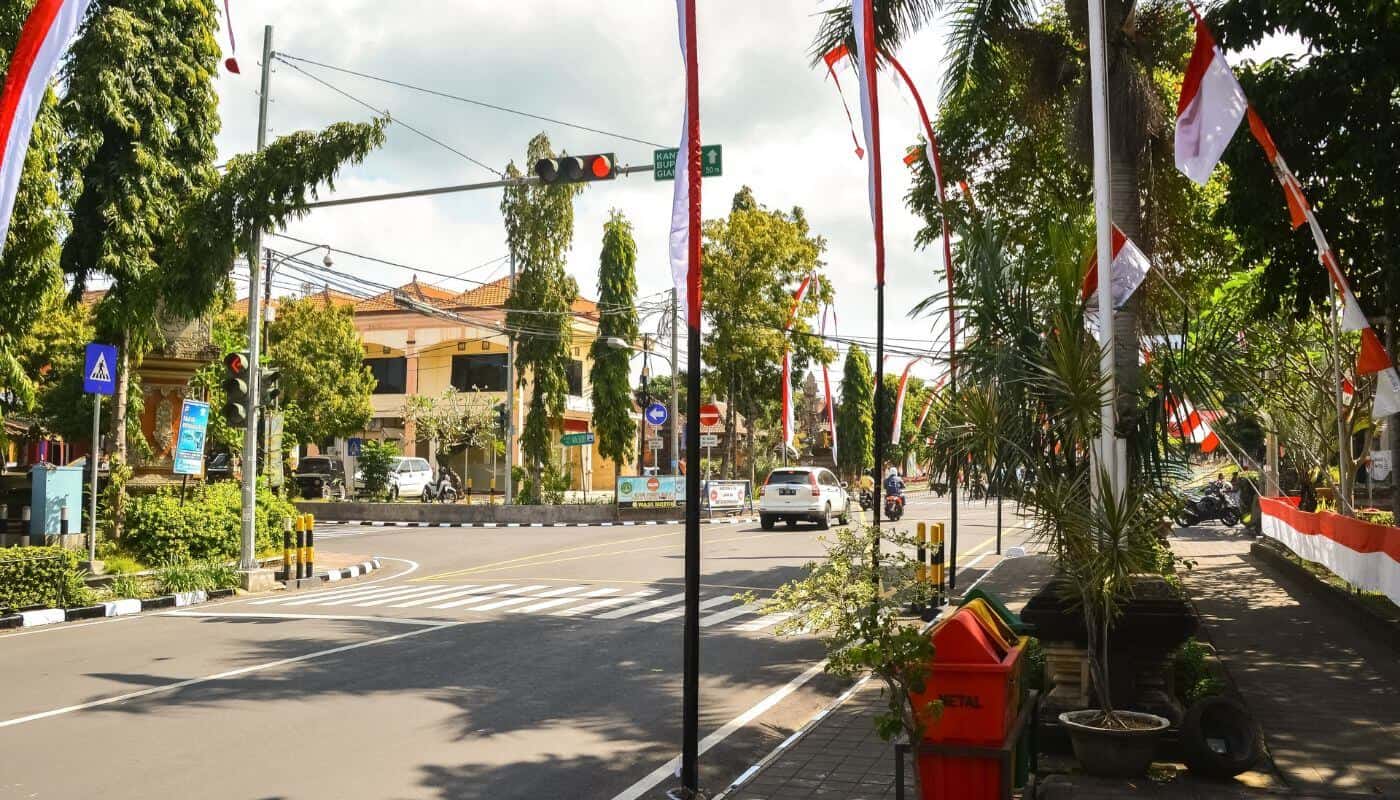
One of the things that keep nomads coming back is the bang for your buck. You can live in comfortable luxury for a reasonable price.
A digital nomad in Canggu spends about USD$1,000 per month. This can fluctuate depending on your lifestyle, of course. If you stay in a guest house, eat local and don’t go out drinking much, you could get by with 750 USD per month; or you could live your best millionaire life and burn USD$2,000-3,000 every month.
I should warn you, the average cost of living is going up! This is partly thanks to high-earning entrepreneurs and influencers finding their way to the paradise, also due to the general standard of living becoming higher as Canggu becomes more developed.
It’s always possible to find more affordable options for food and accommodation if you’re willing to be a little flexible on luxury.
Disclaimer: always be respectful of the locals, and be aware that your digital nomad earnings are considerably more than the average monthly wage in Indonesia. Gentrification is becoming a huge issue in the popular areas. Where possible, rent, eat and shop local!
Accommodation
The biggest cost to take into account is accommodation. A room in a shared villa typically costs about USD$350-700 per month, for a regular, comfortable villa with electricity, drinking water and often a pool.
Airbnb is bursting with cool luxury homes, but the prices are usually marked up. It’s better to contact villa owners directly, for example through Facebook groups (Canggu Community Housing, Canggu Housing, Canggu Nomad Girls Accommodation).
Staying in a guesthouse or hostel is cheaper, at around USD$250-300 per month. There are also special shared accommodations aimed at digital nomads that offer both co-working spaces and opportunities to meet other like-minded people, like Tribal Hostel.
Food and Drink
Food can be cheap or expensive, depending how you. A flat white in a café typically costs USD$3 and a dinner out (or ordered in) about USD$5-10. There are great deals around, and at a local warung or food market you can find a meal for as little as USD$1.5.
Alcohol is surprisingly steep. A bottle of Bintang (local beer) costs USD$3 in a bar, and mixed drinks about USD$8.5. Imported liquor is expensive!
Transport
The best way to get around is to rent a scooter. Monthly rent for a standard Scoopy or Vario is approximately USD$40-50. For more powerful bikes you can pay up to USD$100.
You can also take a taxi, Gojek or a Grab – a motorbike taxi – that usually costs about USD$0.70 for a 5-10 minute trip.
Fitness
Gym memberships can be quite expensive. Monthly memberships including classes cost about USD$140-300. A single exercise or yoga class typically costs USD$8-10.
If you just want to lift some weights, standard gyms are way more affordable (approx. USD$15 per month).
Visa Extensions
If you’re staying for longer than a month, you also have to factor in about USD$50 for a visa extension every month.
The Digital Nomad Community in Bali

The community is one of the biggest draws for Bali digital nomads.
Excellent co-working spaces, worker-friendly cafés, events, workshops, concerts, parties – all these bring the community together, and finding new friends isn’t hard.
The island has been popular with digital nomads for so long that the community is huge! You’ll meet both long-term expats and passing nomads. You can find both future travel buddies, and create lasting friendships. Bali draws in so many different types of people that you’re bound to find your tribe!
It is an excellent base for networking (although slightly notorious as a hub for “coaches who coach coaches”). With its diverse base of entrepreneurs, it’s easy to find like-minded people to bring onboard for projects, or to learn something in lectures and workshops. It is a start-up heaven!
Bali is an intersecting point in many digital nomads’ travels. You could casually bump into friends you made in other parts of the world. You’ll meet people who are just starting out, those who have travelled through all seven continents, and everything in between!
If you’re a digital nomad, sooner or later all roads lead to Bali.
Safety in Bali
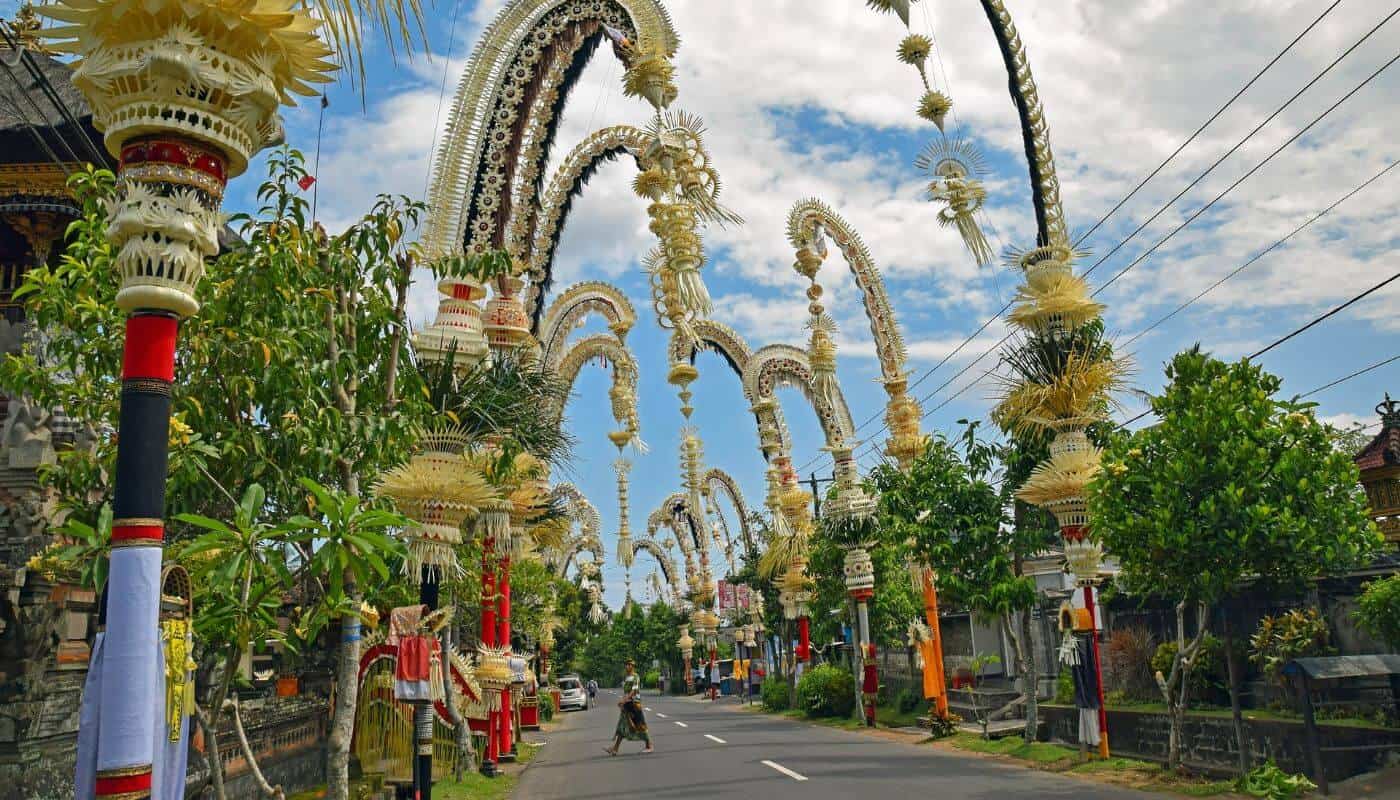
Bali is a safe place. There is very little violent crime towards foreigners. Balinese people are incredibly friendly, and since a lot of the island’s income comes from visitors, they happily welcome digital nomads.
Everyday Hassles
The biggest threat to your personal safety is the traffic. You might enjoy the delightful chaos of driving in Bali but with very few traffic rules, the coin always has two sides.
In this case, traffic accidents. Even if you’re the best driver in the world, Bali streets know how to throw all sorts of curveballs your way. Anything from sneaky potholes and broken roads, to chickens and street dogs, and don’t even get me started on other drivers (I guess it is to be expected when you combine busy roads and inexperienced drivers).
Always wear your helmet! If you truly value your noggin, splurge an extra USD$40 for a brand-new full-face helmet. You can never be sure if the helmets scooter rental places offer have already taken a hit.
Cover up while you’re driving! That way if you do take a tumble, you’ll be spared from nasty road burn.
Riding around without a helmet or shirt might get you stopped by the police, who will ask you for an international driver’s licence – which you, as a responsible traveller, will have. You’ll probably be able to haggle the officer down from a IDR1,000,000 fine to a IDR100,000 bribe, but it’s still an extra (and illegal) hassle that you don’t want to deal with.
Safety During COVID-19
Although relatively out of the woods now, COVID-19 had a detrimental, long standing impact on Bali.
It didn’t descend into purge-like chaos when the tourists left, like some sceptics were predicting. However, since many 80% of the island’s income is from tourism, COVID has totally wrecked the economy.
This resulted in an increase in petty theft. Many foreigners have had their phones and bags stolen, especially when they’re driving. This can be dangerous since thieves don’t really care if you fall off the bike in the process. When you’re cruising about on your scooter, keep your bag under the seat, and definitely don’t keep your phone in the glovebox of the bike. And, wear wireless headphones!
There have been some home break-ins as well. Sure, it’s pretty rare, but hide your valuables in not-so-obvious places and keep the doors locked at all times. Try to find a villa to rent that is managed by a local family or has security outside. It’s also better to live somewhere that allows you to park your scooter inside – nicer bikes like NMAX and XMAX are often stolen!
All in all, Bali is a very safe and comfortable place to stay – but a good travel insurance policy is still worth its weight in gold. The health care system leaves little to be desired, and accidents can rack up pretty hefty bills.
Best Tips for New Digital Nomads in Bali
- Get a scooter as soon as possible. Seriously, it’s so much fun.
- Most housing has an open design – there’s probably a gecko and a couple of spiders living in your room, and that’s okay!
- You can easily get by in English, but Indonesian is a really easy language with minimal grammar. Make an effort to learn! You can hire a private teacher for about USD$6 per hour.
- Join community groups on Facebook (Canggu Community, Bali Digital Nomads, Canggu Nomad Girls). These groups know an answer to absolutely any question you have.
- Plan for the season – while Bali is warm all year round, the rainy season runs from December to May.

